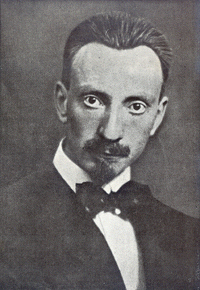Origine: 1910's, The Art of Noise', 1913, p. 6
Contesto: This evolution toward noise-sound is only possible today. The ear of an eighteenth century man never could have withstood the discordant intensity of some of the chords produced by our orchestras (whose performers are three times as numerous); on the other hand our ears rejoice in it, for they are attuned to modern life, rich in all sorts of noises. But our ears far from being satisfied, keep asking for bigger acoustic sensations. However, musical sound is too restricted in the variety and the quality of its tones. Music marks time in this small circle and vainly tries to create a new variety of tones... We must break at all cost from this restrictive circle of pure sounds and conquer the infinite variety of noise-sounds.
Luigi Russolo: Frasi in inglese
Origine: 1910's, The Art of Noise', 1913, p. 6
Contesto: Each sound carries with it a nucleus of foreknown and foregone sensations predisposing the auditor to boredom, in spite of all the efforts of innovating composers. All of us have liked and enjoyed the harmonies of the great masters. For years, Beethoven and Wagner have deliciously shaken our hearts. Now we are fed up with them. This is why we get infinitely more pleasure imagining combinations of the sounds of trolleys, autos and other vehicles, and loud crowds, than listening once more, for instance, to the heroic or pastoral symphonies.
Quote of Russolo in: Le Futurisme: Création et avant-garde, Giovanni Lista, 2001; as cited in Futurism, ed. By Didier Ottinger; Centre Pompidou / 5 Continents Editions, Milan, 2008, p. 47.
undated quotes
Origine: 1910's, The Art of Noise', 1913, p. 8
Russolo. English trans. Barclay Brown (1986: 37).
undated quotes
Origine: 1910's, The Art of Noise', 1913, p. 12
Origine: 1910's, The Art of Noise', 1913, p. 9
Origine: 1910's, The Art of Noise', 1913, p. 5
Origine: 1910's, The Art of Noise', 1913, p. 6
But the quality of continuity that sound has with respect to noise, which seems instead fragmentary and irregular, is not an element sufficient to make a sharp distinction between sound and noise. We know that the production of sound requires not only that a body vibrate regularly but also that these vibrations persist in the auditory nerve until the following vibration has arrived, so that the periodic vibrations blend to form a continuous musical sound. At least sixteen vibrations per second are needed for this. Now, if I succeed in producing a noise with this speed. I will get a sound made up of the totality of so many noises--or better, noise whose successive repetitions will be sufficiently rapid to give a sensation of continuity like that of sound.
Origine: Russolo. English trans. Barclay Brown (1986: 37).
